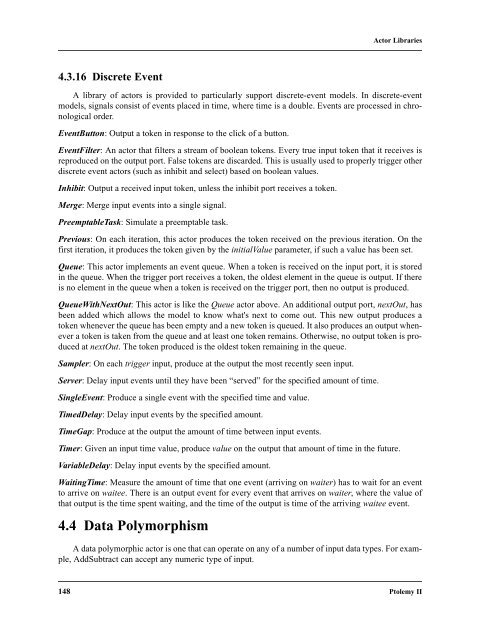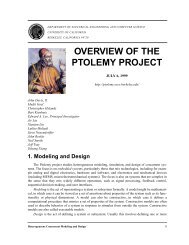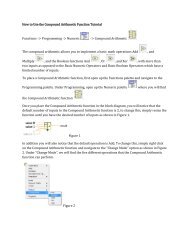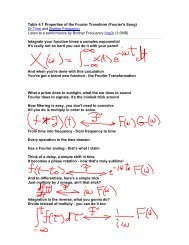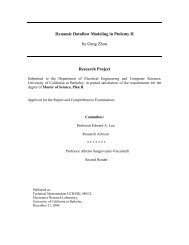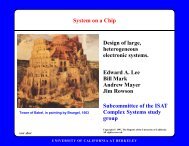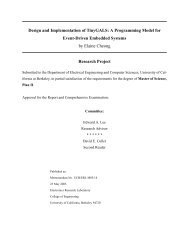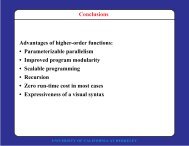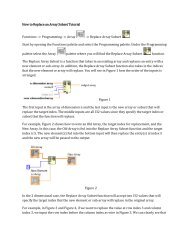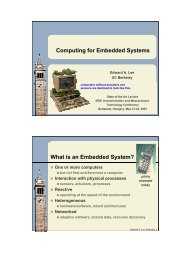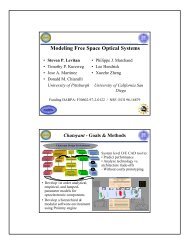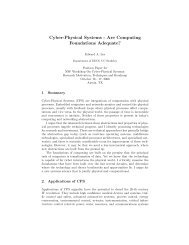PTOLEMY II - CiteSeerX
PTOLEMY II - CiteSeerX
PTOLEMY II - CiteSeerX
You also want an ePaper? Increase the reach of your titles
YUMPU automatically turns print PDFs into web optimized ePapers that Google loves.
4.3.16 Discrete Event<br />
Actor Libraries<br />
A library of actors is provided to particularly support discrete-event models. In discrete-event<br />
models, signals consist of events placed in time, where time is a double. Events are processed in chronological<br />
order.<br />
EventButton: Output a token in response to the click of a button.<br />
EventFilter: An actor that filters a stream of boolean tokens. Every true input token that it receives is<br />
reproduced on the output port. False tokens are discarded. This is usually used to properly trigger other<br />
discrete event actors (such as inhibit and select) based on boolean values.<br />
Inhibit: Output a received input token, unless the inhibit port receives a token.<br />
Merge: Merge input events into a single signal.<br />
PreemptableTask: Simulate a preemptable task.<br />
Previous: On each iteration, this actor produces the token received on the previous iteration. On the<br />
first iteration, it produces the token given by the initialValue parameter, if such a value has been set.<br />
Queue: This actor implements an event queue. When a token is received on the input port, it is stored<br />
in the queue. When the trigger port receives a token, the oldest element in the queue is output. If there<br />
is no element in the queue when a token is received on the trigger port, then no output is produced.<br />
QueueWithNextOut: This actor is like the Queue actor above. An additional output port, nextOut, has<br />
been added which allows the model to know what's next to come out. This new output produces a<br />
token whenever the queue has been empty and a new token is queued. It also produces an output whenever<br />
a token is taken from the queue and at least one token remains. Otherwise, no output token is produced<br />
at nextOut. The token produced is the oldest token remaining in the queue.<br />
Sampler: On each trigger input, produce at the output the most recently seen input.<br />
Server: Delay input events until they have been “served” for the specified amount of time.<br />
SingleEvent: Produce a single event with the specified time and value.<br />
TimedDelay: Delay input events by the specified amount.<br />
TimeGap: Produce at the output the amount of time between input events.<br />
Timer: Given an input time value, produce value on the output that amount of time in the future.<br />
VariableDelay: Delay input events by the specified amount.<br />
WaitingTime: Measure the amount of time that one event (arriving on waiter) has to wait for an event<br />
to arrive on waitee. There is an output event for every event that arrives on waiter, where the value of<br />
that output is the time spent waiting, and the time of the output is time of the arriving waitee event.<br />
4.4 Data Polymorphism<br />
A data polymorphic actor is one that can operate on any of a number of input data types. For example,<br />
AddSubtract can accept any numeric type of input.<br />
148 Ptolemy <strong>II</strong>


